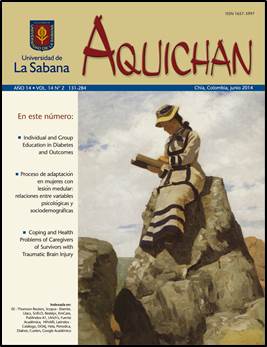Coping and Health Problems of Caregivers of Survivors with Traumatic Brain Injury
Keywords:
brain injuries, caregivers, adaptation, psychological, patient discharge, survivors, nursingAbstract
DOI: 10.5294/aqui.2014.14.2.5
Objectives: To evaluate coping and the health problems of caregivers at the time of survivor discharge and at one month after discharge and to determine correlations among personal data, coping and health problems of caregivers and disability of survivors. Method: Eighty-five dyads of survivors with traumatic brain injury and their caregivers were included. The instruments employed for data collection were the 27-item Thai version of the Coping and Adaptation Processing Scale-Short Form, the Health Problem Questionnaire for caregivers and the Disability Rating Scale for survivors. The Roy Adaptation Model was used as a conceptual framework for this study. Pearson’s product moment correlation coefficient was employed for analysis. Results: No statistical differences were found between coping and health problems among caregivers. The health problems most frequently reported by caregivers were headache on the day of discharge and no health problems after one month of caregiving engagement. The disability level and marital status of the caregivers were correlated negatively with coping (r = -.245, p = .024, r = -.220, p = .043, respectively). Conclusions: The findings delineated that the caregivers remained able to handle the difficulties involved in caring for survivors at home with fewer health problems. Married caregivers were likely to manage this burden better than other caregivers. DOI: 10.5294/aqui.2014.14.2.5
Downloads
Downloads
Published
How to Cite
Issue
Section
License
1. Proposed Policy for Journals That Offer Open Access
Authors who publish with this journal agree to the following terms:
- The journal and its papers are published with the Creative Commons License Attribution-NonCommercial-NoDerivatives 4.0 International (CC BY-NC-ND 4.0). You are free to share copy and redistribute the material in any medium or format if you: give appropriate credit, provide a link to the license, and indicate if changes were made; don’t use our material for commercial purposes; don’t remix, transform, or build upon the material.





